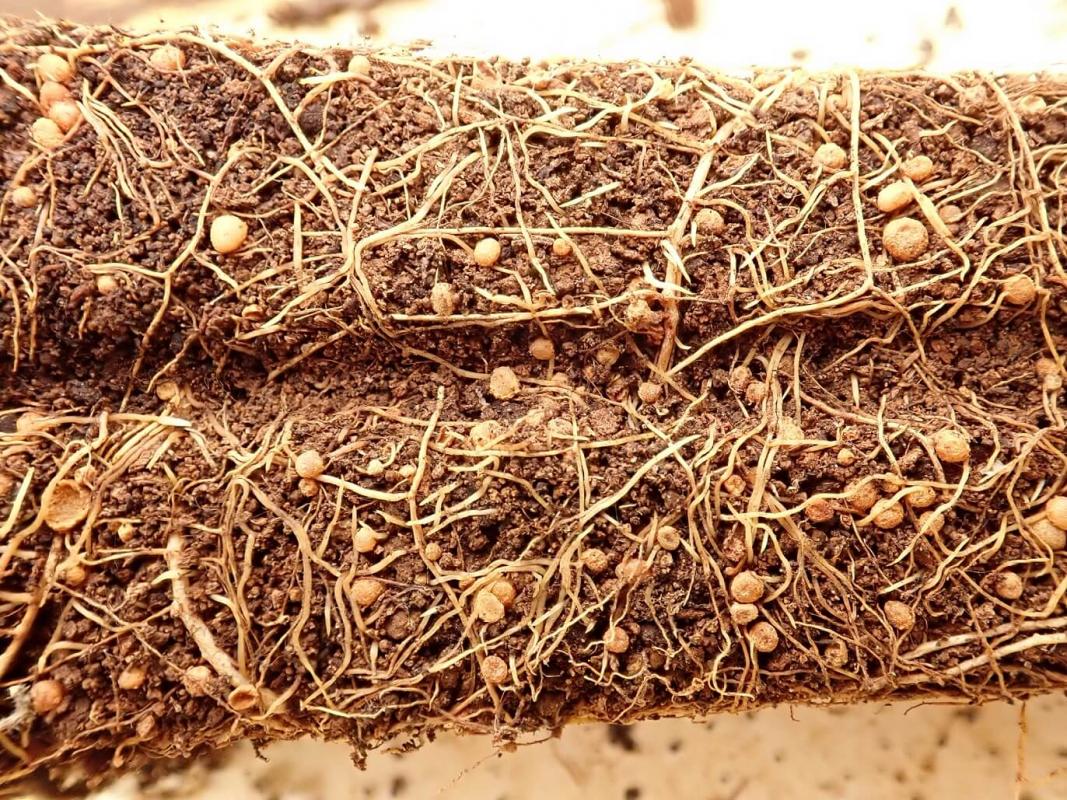- Home
- Worldwide
- CIRAD worldwide
- Projects
- REBIOS project
Identifying and mobilising soil biological resources to develop sustainable agricultural systems - REBIOS

Root knots of Piscidia carthagenensis (Fabaceae) formed by rhizobium, a symbiotic soil bacterium © A. Galiana, CIRAD
Issues
Martinique is part of the biodiversity hotspot of the Caribbean islands. However, knowledge of this diversity is still insufficient, especially where soil biodiversity is concerned. The soil nevertheless hosts a large number of species and the rate of endemism is often higher there than on the surface. Soil organisms are therefore of clear interest in terms of heritage. They also act as beneficials by providing different ecosystems services. For example, mycorrhizal fungi enable plants to better absorb mineral elements and also increase their tolerance to pathogens as well as to environmental stress. Rhizobia are nitrogen-fixing symbiotic bacteria that enable legumes (plants in the family Fabaceae) to fix atmospheric nitrogen. Macrofauna also plays an important role. Earthworms have a beneficial effect on soil structure by improving water infiltration and nutrient recycling. They can also be used to produce compost through vermiculture.
The REBIOS project thus aims to improve knowledge of soil biology in Martinique, focusing on the study of three components that play a potentially beneficial role in soil fertility: arbuscular mycorrhizal fungi, rhizobia , and the earthworms endemic to Martinique.
Description
By focusing on these three elements of soil biology, this crosscutting project generates scientific and technical knowledge that can be used for all crops, whether for export or for local markets. It has two key objectives:
- Acquiring knowledge of native species in Martinique (earthworms and symbiotic microorganisms) and improving understanding of species distribution across the territory, in order to locate available endangered or abundant resources. The project will produce a functional characterisation of these beneficial organisms in order to better understand their potential to improve soil fertility, and to select the most useful species in the island’s native fauna, without introducing new organisms.
- Integrating this new knowledge into the management techniques for the main crops in Martinique. Tests will be conducted under controlled conditions and in the field in order to define methods for integrating these beneficials into banana and vegetable cropping systems. This will enable the transfer of this knowledge to economic actors (farmers, plant nurseries, etc.).
Expected impacts
- The research findings will be disseminated to sector professionals (farmers, plant nurseries, compost producers, etc.) and to the general public through different communication actions on CIRAD’s research station (CAEC), as well as in collaboration with the Martinique Biodiversity Observatory (PNM)
- The adoption of new agricultural practices deriving from the use of soil biological resources will be promoted. These practices, applicable across all types of farming in Martinique, are based on the recycling of plant waste through vermiculture and the use of plants with high symbiotic potential to maximise symbiotic nitrogen fixation and mycorrhization.
- Ultimately, the project will contribute to reducing the dependence of agriculture on chemical fertilisers that use fossil fuels.
- The recycling and use of organic waste produced locally (vermiculture) will be consolidated and the local agricultural fabric will be stimulated by creating activities linked to the use of these products.
Contract partners
Service d'expérimentation en agroécologie (SEA – CTM)
Other partners
Conservatoire Botanique de Martinique, Parc Naturel de Martinique























